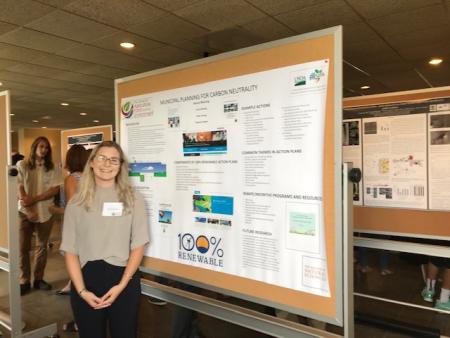Clean Energy Interns
Current Clean Energy Intern Projects
-
Social Equity Distribution of the MA Solar Market
Clean Energy Corps member Pranav Heryani is working with Professor Crago in Resource Economics and Professor Breger in Environmental Conservation and Clean Energy Extension to evaluate the equity impacts of the Massachusetts RPS Solar Carve-Out programs. The state programs led to nearly 90,000 solar PV systems being installed between 2010 and 2018, and placed MA as one of the leading states in solar growth. The research analysis will evaluate the state databases of the 90,000 qualified systems, and allocate the distribution of economic rents across these projects. -
Carbon Neutral Planning

A growing number of Massachusetts cities and towns have passed resolutions committing to the goal of 100% renewable energy or zero carbon emissions. Introductory checklists and toolkits are available to aid communities in developing plans to move towards this goal, but the tools require further development and expansion to provide meaningful support for municipal planning. Clean Energy Corps member Jessica Mooring is working with CEE Postdoctoral Research Fellow Zara Dowling to develop effective, user-friendly factsheets and spreadsheet tools to allow communities to identify clear and achievable paths to carbon neutrality. -
Offshore Wind and Energy Storage
Corps members are working with CEE Director Dwayne Breger to develop a system dynamic model that simulates the energy, capacity, and economic implications of adding large-scale energy storage to offshore wind projects. Students are exploring the connections between the annual performance of offshore wind and wholesale energy markets to demonstrate and optimize the value added by storage to wind developers and ratepayers in the context of the anticipated offshore wind development off the coast of Massachusetts.
Read a summary of the modeling effort: Modeling Approaches
Project poster: Offshore Wind and Energy Modeling - Poster
Summer/Fall 2019 Clean Energy Interns

Dugan Becker
Westwood, MA
B.S. Natural Resources Conservation (2019)
Favorite Fruit: Raspberries
Pranav Heryani
Dubai, U.A.E.
B.S. Environmental Sciences and Economics Minor (2020)
Favorite Fruit: Mangos
Vaishnavi Nandi
Mumbai, India
M.S. Sustainability Science, Urban Sustainability (2020)
Favorite Fruits: Strawberries and Mandarins
Past Corps Members
- Simon Pereira, B.S. Geography - GIS; Natural Resources Conservation (2020)
- Connor Hughes, B.S. Natural Resources Conservation (2020)
- Jennifer Taylor, B.S. Mechanical Engineering (2020)
- Charles Misenti, M.S. Sustainability Science (2019)
- Nicholas Pontes, B.S. Environmental Science (2019)
- Graham Sahagian, B.A. Finance; B.F.A. Chinese Language and Literature (2019)
- Varsha Suresh, M.S. Sustainability Science: Renewable Energy (2018)
- Matthew Raymond, B.A. Sustainable Building Science & Technology (2018)
- Juan Toro-Killion, B.S. Geography; Hospitality & Tourism Management (2018)
- Jeremy Price, M.S. Sustainability Science: Renewable Energy (2018), Master of Regional Planning: Land-use & Environmental Planning (2017)
- Rebecca Howard, B.S. BDIC: Sustainability Science (2019)
- Rachel Bratton, B.S. Environmental Science; Resource Economics (2019)
- Francesca Cigliano, B.B.A. Management and Sustainable Community Development, (2018)
- Nicholas Cutrone, B.S. Natural Resource Conservation; Resource Economics (2019)
- Emily Hespeler, B.S. Environmental Science (2019)
- Ian Weishar, B.S. Forest Ecology & Conservation (2017)
- Christos Saledas, B.S. Environmental Science (2017)
Recent Corps Projects
Greening Municipal Fleets: Data Analysis and Report
CAFE Summer Scholar Dugan Becker worked as a member of CEE's Clean Energy Corps to investigate municipal vehicle fuel usage levels, trends, and patterns in rural communities, identify best practices for reducing vehicle fuel usage and its associated costs, and provide practical resources to rural Massachusetts communities seeking to advance vehicle efficiency. His report addresses the transportation‐related issues unique to rural communities by:
- Identifying the major barriers that frequently prevent rural communities from achieving optimal fuel efficiency in their fleets
- Pinpointing some of the primary sources of fuel consumption/inefficiency within rural communities
- Enumerating some of the promising tools and techniques available to communities to assist in their reduction efforts
Report: Reducing Municipal Vehicle Fuel Consumption in Rural Massachusetts Communities
Municipal Aggregations Survey
In collaboration with CEE staff and the Western Massachusetts Community Choice Energy group, Corps member Varsha Suresh compiled current and historic electricity rate data for both electric utilities (e.g. National Grid, Eversource) and municipal aggregations, which purchase electricity in bulk for residential and business customers in their respective cities or towns. We analyzed this data to determine whether municipal aggregations in Massachusetts are meeting stated goals of aggregation, including price savings, price stability, and increased renewable energy content in the electricity supply.
Report: A Survey of Municipal Aggregation Performance in Massachusetts
Renewable Thermal Mapping
Together with CEE staff, Corps members worked to create geographic information system (GIS) databases and visualizations that helped to identify promising locations and commercial sectors that might benefit from renewable thermal technologies such as solar hot water, heat pumps, modern wood heating, district heating, and more. Corps members compiled factors such as the size, location, business type, and fuels used in commercial facilities with large heating demands that might best take advantage of renewable thermal technologies. Regional heating demands can then be compiled and visualized together with strategic partners (e.g., heating supply companies) that can help to outreach to and further develop these markets.
UMass Heat Load Analysis
As the UMass central heating plant approaches its current heating capacity, CEE partnered with the UMass Physical Plant to analyze new options for heating buildings on campus. Corps members worked with the Physical Plant and the Office of Sustainability to identify buildings that may be appropriate candidates for distributed renewable thermal technologies in place of the steam district heating system currently used throughout campus.
GIS Analysis of the Commonwealth Woodstove Change-Out Program
Corps member Varsha Suresh Bangalore mapped the rates of woodstove change-outs across the Commonwealth, using data available for the Massachusetts Clean Energy Center.
Download the project poster here: Facilitated Woodstove Replacement Within the Commonwealth of Massachusetts
The Electric Vehicle Infrastructure at UMass Amherst: Analysis and Recommendations
Reflecting national trends, the use of EVs at the University of Massachusetts Amherst (UMass) is on the rise.However, barriers to EV adoption remain. Working with CEE staff, UMass Transportation Services, and EV experts across the field, Emily Hespeler looked at current EV policies in place at UMass, analyzed usage trends at campus charging stations, and investigated case studies at other schools. Emily's findings help to elucidate current campus infrastructure usage patterns and provide general recommendations for strengthening the EV infrastructure at UMass Amherst.
Download the final report here: Electric Vehicle Infrastructure at UMass Amherst: Analysis and Recommendations
Northampton, MA: Exploring the Relationship Between Home Age & Energy Efficiency
The City of Northampton, Massachusetts is seeking to reduce its carbon footprint by increasing the number of residents investing in home energy improvements. As such, the City has developed the HeatSmart Northampton campaign – an outreach program designed to encourage residents to replace older oil and natural gas heating systems with renewable thermal energies. To assist in this effort, Corps member Francesca Cigliano used GIS spatial analysis to analyze energy and property data, and correlate energy efficiency data with building age and location. Francesca’s work enables the City to better target outreach activities toward likely adopters of home energy improvements.
Download the project poster here: Northampton, MA: Exploring the Relationship Between Home Age & Energy Efficiency
ArcGIS Analysis of MassDEP Boiler Database for Clean Energy Strategies
The MassDEP Boiler Database contains data on ~7,000 power plants and industrial boilers, which could be candidates for district heating, combined heat and power, or conversion to renewable fuels. Corps member Christos Saledas brought the data into ArcGIS and queried the database based on fuel source, throughput, and location to identify likely candidate facilities for these technologies. Christos’s work will enable Clean Energy Extension to target outreach to facilities with high potential to adopt innovative clean energy strategies.
Download the project poster here: ArcGIS Analysis of MassDEP Boiler Database for Clean Energy Strategies







